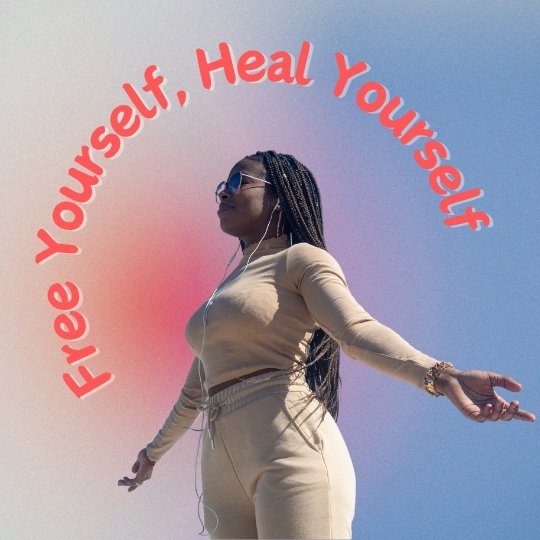The Power of Self-Forgiveness: How to Begin Letting Go
If I could go back and tell my younger self one thing, it’d be this:
Carrying guilt won’t make things better—it’ll keep you stuck.
I learned this the hard way.
I’m the youngest of 10, raised in a loving, two-parent home. My dad worked two full-time jobs to give us a better life, and my mom always made sure we felt loved and cared for. When I got pregnant at 17 with twins, I felt like I’d let everyone down.
I was in college at the time, and to help me stay in school, my mom left her job to care for my boys. My dad came out of retirement to work full-time as a custodian so we could make ends meet. I’ll never forget the deep guilt I carried, knowing how my decisions had affected not just me but my entire family.
My relationship with their father was rocky, and when it ended, I was left trying to support myself and my kids. I felt like I had to carry that guilt as a constant reminder to push myself to do better.
So, I doubled down—on working harder, being tougher on myself, and convincing myself that guilt was the price I had to pay.
But here’s what I know now: Guilt doesn’t help you move forward. It just weighs you down.
Why Self-Forgiveness Matters
We’ve all made choices we wish we could undo- a harsh word spoken in anger, a decision that hurt someone we care about, or an opportunity we missed; it’s easy to let guilt linger. When held onto for too long, guilt becomes a chain that keeps you stuck in the past.
It’s important to understand the difference between guilt and shame. Guilt says, “I made a mistake.” Shame says, “I am the mistake.” While guilt can motivate change, shame often keeps us trapped in self-criticism and hopelessness. Self-forgiveness helps us move beyond both, allowing us to reclaim our sense of worth.
When you let go of guilt, you create space to grow, heal, and embrace a brighter future. You begin to see yourself not as the sum of your mistakes but as someone capable of learning, improving, and thriving.
Steps to Begin Letting Go
Letting go of guilt takes courage, but it’s a process you can start today.
Name Your Guilt
Say it out loud or write it down. This can feel uncomfortable, but it’s the first step to freeing yourself from the emotional weight. Instead of saying, “I’m a bad person,” reframe it as: “I feel guilty for my actions.” Guilt is temporary—it doesn’t define you.
Understand Your Mistakes
Ask yourself: “Why did I act this way?” Look at the emotions or circumstances that influenced your actions. Self-awareness helps you recognize patterns and make better choices moving forward.
Take Responsibility
Self-forgiveness isn’t about avoiding accountability. It’s about owning your actions and acknowledging their impact. This could mean apologizing to someone, making amends, or reflecting deeply on how to repair the harm caused.
Learn and Commit to Growth
Mistakes are growth opportunities. What lessons can you take from this experience? How can you make choices that align with your values? Commit to being kinder, more thoughtful, and more intentional in the future.
Write a Forgiveness Letter
One powerful exercise is writing a letter to yourself. In this letter, reflect on your choices, express understanding for your younger self, and offer words of forgiveness. It may feel odd at first, but it’s a transformative way to release guilt.
Practice Mindfulness
Guilt often keeps us anchored in the past. Mindfulness can help bring you back to the present. Try deep breathing exercises or grounding techniques to center yourself when guilt feels overwhelming.
Seek Support
You don’t have to navigate this journey alone. Share your feelings with someone you trust—a friend, family member, ortherapist. Sometimes, hearing an outside perspective can help you see your situation in a new light.
Release the Guilt
Letting go doesn’t mean you forget or dismiss the past—it means you choose not to let it control your future. Remind yourself: “I did the best I could at the time. I’m growing and moving forward.”
The Role of Therapy in Self-Forgiveness
Forgiving yourself can feel overwhelming, especially if you’ve been carrying guilt for a long time. That’s where therapy comes in. At Walk With Me Counseling Center, we understand the emotional weight of guilt and shame and are here to help you work through it.
Through individual therapy, we’ll help you:
Process feelings of guilt and shame
Develop self-compassion and acceptance
Break free from limiting beliefs
Reframe your mistakes as opportunities for growth
Our goal is to create a safe, supportive space where you can begin to heal and rediscover your worth.
You Deserve Peace and Healing
Looking back, I don’t see my younger self as a failure—I see a young woman doing her best in a challenging situation. My journey taught me that forgiveness is one of the greatest gifts you can give yourself.
You are not your mistakes. You are worthy of love, growth, and a brighter future. Are you ready to take the first step toward healing? Let us walk with you on this journey.
Take the Next Step
Don’t let guilt hold you back any longer. Schedule a session with one of our licensed therapists at Walk With Me Counseling Center today and start the journey toward self-forgiveness and peace.

